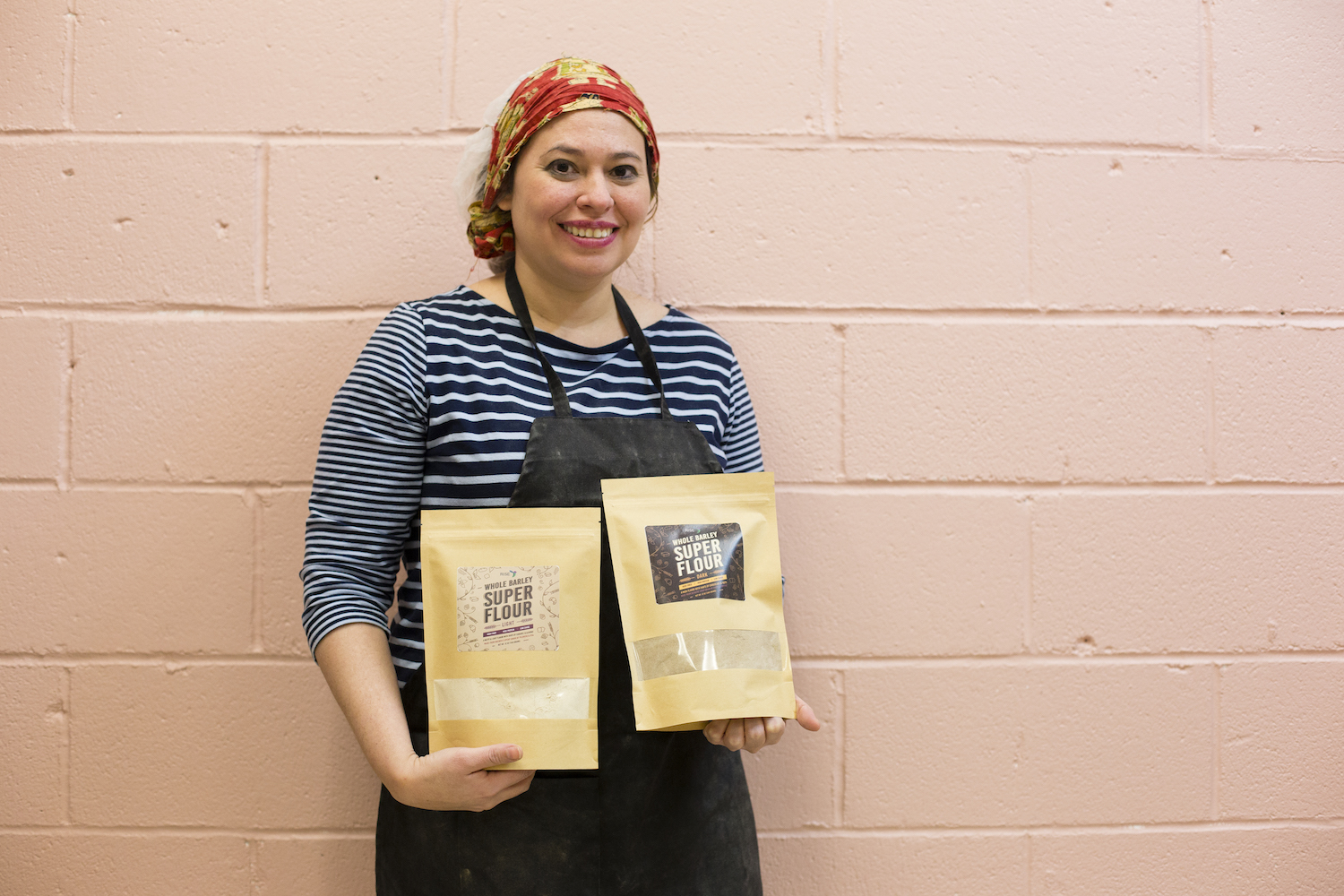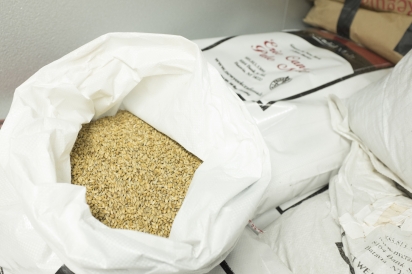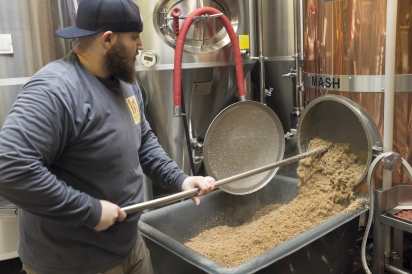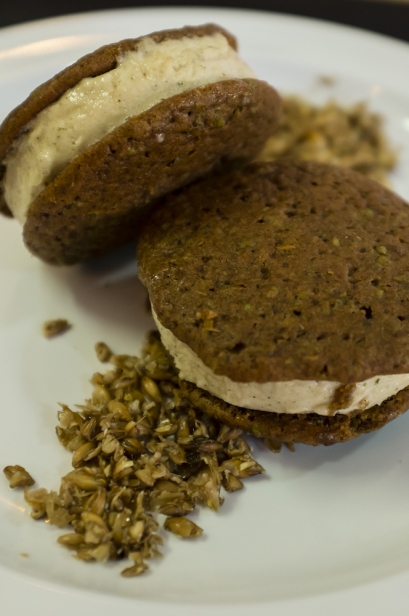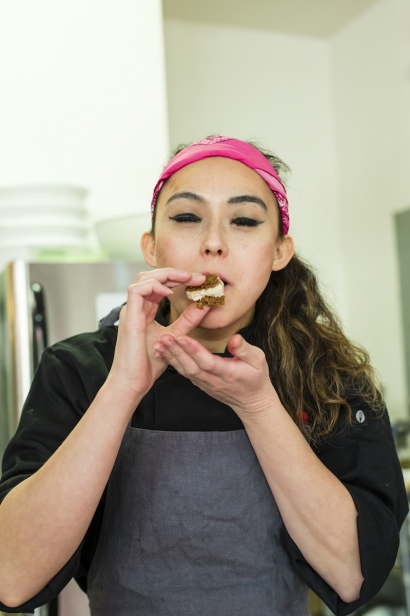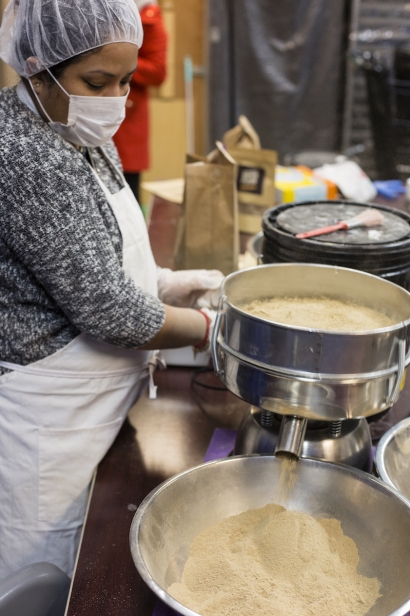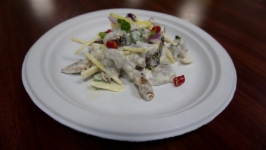From Barley to Brownie: Rise Products fights food waste by turning local breweries’ spent grains into flour
You can hear Bridge and Tunnel Brewery before you see it. Black Sabbath thrashes over the stereo in a converted garage on Ridgewood’s Decatur Street. Inside, brewers Rich Castagna and John Oe Danyi have been working since 4am. By 10am, the self-styled “Mr. Green” (Castagna, for his environmentally conscious inclinations) and “Mr. Clean” (Danyi, not for his shaved dome but rather for his mop-wielding skills) are finishing a brew session, sloshing water across the floor and scrubbing out kegs.
Around this time on a recent Saturday, they entertained a visitor from Rise Products. He scooped a portion of the brewery’s spent grains—the clumpy barley byproduct of the first stage of making beer—from the mash tun, a dairy tank Castagna converted for brewing. From there, the grains journeyed to Entrepreneur Space, a shared commercial kitchen in Long Island City where, the next day, Rise founders Bertha Jimenez and Jessica Aguirre and COO Ashwin Gopi milled the grains into flour, destined for home and professional kitchens.
Jimenez established Rise in January 2017, shortly after earning her doctorate from New York University’s Tandon School of Engineering. Rise emerged from her interest in industrial symbiosis, the premise that waste from one process can be used as the raw material for another. Breweries make a fertile local testing ground for the concept, because New York’s populous craft beer community produces a vast volume of spent grains. Speaking with private waste haulers confirmed this: Spent grains, Gopi discovered, are the largest source of homogeneous waste in New York City. (Other industries, like restaurants, might produce a higher volume of organic waste, but it’s often a melange of discarded food bits.)
“Spent grain is the paragon of what you want as far as compostable material,” said Hannah Goldman, Mikkeller Brewing’s operations manager in Corona. That is, it’s just one thing: a mash of malted barley, sapped of much of its sugar and starch but high in protein and fiber. But it’s also notoriously perishable and begins fermenting within hours: “It’s a time bomb of stank,” said Anthony Accardi, of Long Island City’s Transmitter Brewing.
Within the city, disposing of the grains presents a distinct financial and logistical challenge: In more remote areas, brewers might send their grains to farmers. In New York City, that isn’t feasible. Fifth Hammer, Big Alice, Finback and Bridge and Tunnel pay for composting services; Singlecut, in Astoria, sends its grains to farms upstate to use as animal feed; Mikkeller does both. Transmitter simply offers up its grains to the landfill. A little more than a year ago, Rockaway Brewing Company, whose grains also get composted, tested a small onsite biodigester, giving the resulting soil to nearby Brooklyn Grange—but the machine’s capacity was well below their grain output and the experiment ended after six months.
“If I had a large enough site, I would have my own biodigester and I would turn it into electricity and heat and fuel and recycle it into the brewery itself,” said Rockaway brewer Ethan Long. “Part of it’s dollars and cents, and part of it’s environmental consciousness”—which “are not necessarily mutually exclusive,” Goldman echoed separately. “Sometimes, if orchestrated right, those things go hand-in-hand.”
The New York City Brewers Guild has also been examining possible solutions with a consultant, but this has not yet yielded an answer. “There’s not a one-size-fits-all solution,” said Mary Izett, secretary of the Brewers Guild and co-owner of Fifth Hammer. Still, Big Alice brewer Kyle Hurst said he’s noticed some momentum towards sustainability, in part because “the focus on the neighborhood brewery is back. It’d be hypocritical for us not to be supporting locally as well.”
Right now, Rise is a prospective local solution to a local problem. Over the past two years, the startup has collected waste from nearly 20 breweries around Brooklyn, Queens and the Bronx, but it doesn’t yet have the capacity to take all the grains from all the city’s breweries, or even all the grains from one brewery. Despite that, Rise has loftier ambitions: Jimenez recently entered discussions with Kellogg’s, Whole Foods and DiGiorno, who made a prototype frozen pizza using a Rise flour crust.
Peter Endriss, head baker at Brooklyn’s Runner & Stone, was among the first bakers Rise approached with their product—as Jimenez tells it, she brought him an offering of alfajores made with the flour—and with his feedback, they refined its texture and took advantage of the grains’ rich, savory flavor profile instead of mimicking white flour.
“Before we met this guy, we thought people liked flour without any taste,” Jimenez said. “He was, like, ‘Your flavor is your differentiation.’” Endriss makes a now-cult-favorite shortbread with Rise flour, selling it at the restaurant, its bakery and its greenmarket pop-up. Former Crosby Street Hotel patissière Anna Fitting uses Rise flour in her latest endeavor, Ice C.R.E.E.M. Social, a roving pop-up whose ice cream sandwiches are made with upcycled products—including Rise flour.
Brewers have proved willing allies: For a pop-up event at Kings County Brewers Collective, in Brooklyn, Fitting and her culinary partner, Denzell Washington, baked crackers made with flour from Mikkeller’s Henry Hops IPA and Big Alice’s A Ship In Harbor stout. (While their most successful experiments with Rise flour have veered sweet, Washington told me he’s “working on the savory aspect”; Fitting has also made a pizza crust.) Back in the taproom at Big Alice, a sign advertises Rise’s spent-grain brownies; they recommend pairing with the brewery’s stout. (Grains from the same stout have been harvested for Rise’s dark flour, with which Aguirre began making the brownies in her own kitchen.) As we departed Bridge and Tunnel, Castagna and Tatz had already begun discussing potential collaborations.
“I’ve seen compost go away and become dirt, and I’ve seen it end up on fields, and now, I’ve seen these fields sprouting and growing, and it’s, like, ‘That’s our grains on those fields,’” Castagna said. “We get to see where it’s going.” It’s just that now, where it’s going is slightly closer to home.
Bridge and Tunnel Brewery | @bridgeandtunnelbrewery
John Oe Danyi | @metalheaddad
Rise Products | @riseproductsco
Entrepreneur Space
Bertha Jimenez | @mina0727
Mikkeller Brewing | @mikkeller.nyc
Transmitter Brewing | @transmitterbrewing
Fifth Hammer Brewing | @fifthhammerbeer
Big Alice Brewing | @bigalicebrewing
Finback Brewery | @finbackbrewery
Singlecut Beersmiths | @singlecutbeer
Rockaway Brewing Company | @rockawaybrewco
Brooklyn Grange | @brooklyngrange
The New York City Brewers Guild
Kyle Hurst | @noinstakyle
Runner & Stone | @runnerandstone
Crosby Street Hotel
Anna Fitting | @alaminuit
Kings County Brewers Collective | @kcbcbeer


